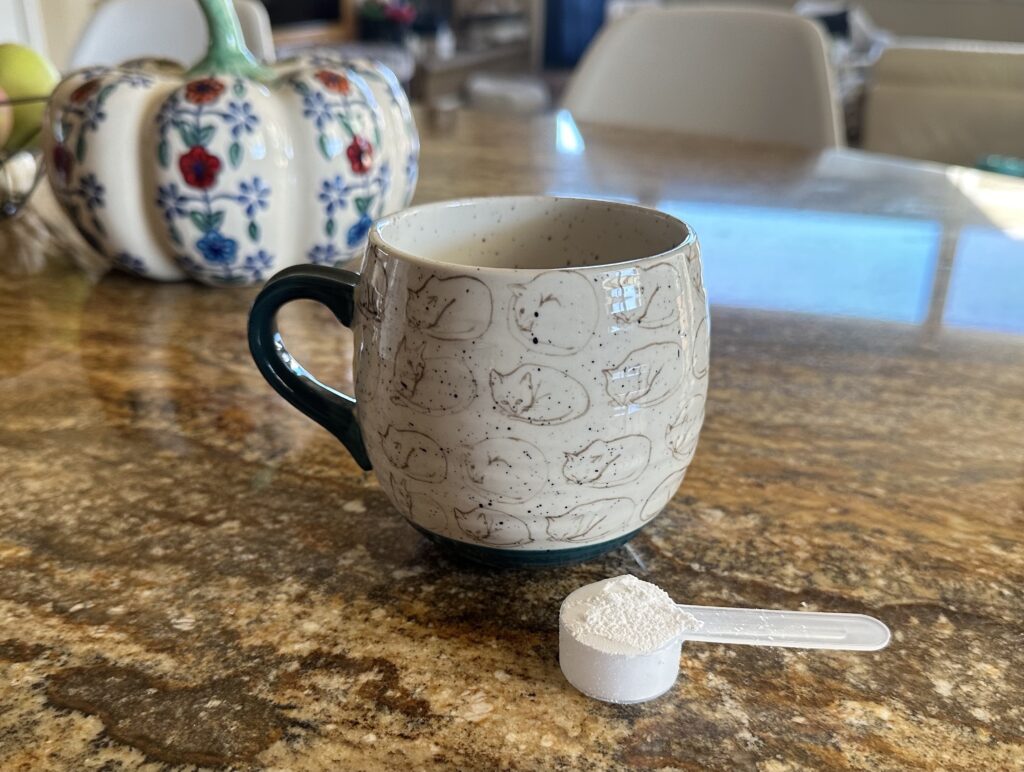12/9/25: Vitalura Labs is still my tried and true favorite, NSF third party tested supplement. I’ve been pretty quiet on the blog lately because some seasons of life require different amounts of attention. Thank you everyone who has still come by to check for new reviews and articles; I really appreciate knowing that while I’m on my own personal wellness journey I can still help others, too.
I’m updating this post because there was an interesting study that came across my email recently about creatine supplementation. The study was published November 2025online by Cambridge University Press titled “Creatine Supplementation for treating symptoms of depression: a systemic review and meta-analysis.”
A sometimes little known fact about being a Registered Dietitian is that we can also provide evidence-based impactful practices for people who are suffering from various mental health conditions, including depression and anxiety. Mental health treatment is an area of the dietetic world that I’ve become more active in during the last couple of years. I’ll be posting a separate article to talk about mental health and nutrition in the future but now I thought it would be poignant to add this latest bit of research.
This was a systematic review looking at assessing the effects of creatine supplementation on symptoms of depression. The authors used 4 different databases to find trials comparing creatine with placebo supplementation in individuals with or without depression. The full methods and extraction of information can be read in the study but to keep this blog update short I’m going to skip ahead to touch on the results of the review. The analysis findings suggest that creatine may offer small benefit for individuals with depression but evidence is still lacking thus requiring larger and more randomized trials.
In my opinion this is fantastic, even if we can’t yet draw conclusions. Creatine supplementation having a place outside of general fitness would be an incredibly interesting addition to add to different types of studies. If you’re a supplement nerd like me you’re probably also excited by this.
So for now anyway, creatine is great for your recovery and muscle synthesis and who knows- in the future it just might also be used in treatment of depression.
As always, using my code SARAHMILLER will save you shipping at checkout 🙂
I’ve always been very choosy with my supplements both for safety and quality reasons but also for financial. There are many supplements on the market that can be overkill when someone is eating a balanced diet that result in creating expensive urine.
Why would I spend extra money on something that I’m already getting plenty of in my dietary habits? Additionally being picky has meant that many supplements just didn’t appeal to me since they didn’t have the third- party certifications I look for.
Except that I’m probably not getting plenty of creatine because of my choice of diet. I follow a vegan diet, and as I’ll explain later this means I would likely benefit from supplementation of creatine. It’s also worth noting here that creatine monohydrate is vegan-friendly. If you follow a vegetarian diet of any type you’ll also want to keep reading.
If you’re new to supplements or don’t really know the quality/safety specifics I recommend checking out my previous post Let’s Chat: Supplements to learn more.
Some Science
Creatine is a naturally occurring substance. Your body makes creatine in the liver, kidneys and pancreas and converts it into creatine phosphate (or phosphocreatine) and stored in your muscles where it can be used for energy. When you engage in short duration, high intensity bursts of activity (think HIIT, sprinting, weight lifting) phosphocreatine is used in your body.
Despite there being numerous studies looking at creatine’s ability to improve athletic performance, not all bodies are the same and therefore not everyone’s body responds to creatine the same way. Dietary intake of creatine can also influence your body’s response to supplementation. Some individuals may have more naturally occurring creatine in their body from their diet and therefore not see the same benefit from supplementation as someone who has a lower storage amount.
Vegans and vegetarians are a population who tend to have lower overall creatine stores; likely because of the omission of meat and fish from their diets. It has been demonstrated that increasing creatine through supplementation may be more beneficial for vegetarians (all types who avoid meat and fish) when compared to non-vegetarians.
Some studies have demonstrated that creatine supplementation can be helpful for people with muscle weakness due to illness. However, the majority of people interested in taking creatine are here because they want to improve their athletic performance.
It’s important to reiterate that creatine has been demonstrated to improve exercise associated with high bursts of energy in short durations and not necessarily in endurance based exercise. Study results looking into its ability to improve endurance based activity performance has been mixed.
My Experience
My first time trying creatine was honestly because Vitalura Labs released one. I immediately bought theirs to try, one because I practice what I preach and I want to support this amazing company, but two because I knew it would be top quality. Every product in their product line has been top notch with NSF certification so I knew their creatine would be no different.

Scoop size next to a coffee cup for reference.
I started taking it about 7 weeks ago. Honestly, at first I didn’t notice much. It was easy to mix into just about anything since it’s a small amount of powder.
But like any change it takes time to notice anything, good or bad. I kept with it and have now been taking it regularly for a little over a month. By about week 5 of taking 5g creatine daily I noticed a significant development that kept me going on the creatine train.
What I Found
While doing my usual lower body routine one day I decided to try increasing the weight stack, just to see if I could complete a rep or 2 at the higher weight. To my surprise, not only was I able to complete 2 reps, I was able to do my entire planned set at that higher weight. The weight isn’t a lot when compared to body builders and hardcore weight lifters, but it was a weight level that I have never successfully been able to lift for more than 1 set of 3 reps. Let me tell you, I was so excited that I immediately checked the weight stack again just to be sure that I wasn’t hallucinating.
Of course there’s a bit to unpack here. Obviously I’ve been very consistently working out and working toward a specific goal. I’m not belittling the effect that consistent strength work can have on your ability to lift more weight. What I think is important to share here is that I didn’t experience the expected and usual fatigue that would set in so quickly whenever I had previously tried to lift the same amount of weight. That ability to push more is where I give the creatine credit.
Another side effect that I did notice was a slight increase in my body weight, very likely due to water retention. This is a known creatine side effect and not one to fear. Water weight gain isn’t real mass and will leave when you stop using it. My own experience of stopping creatine to see if the water retention disappeared worked and I was at my “normal” weight within a week.
It’s important to note that the amount of water retention someone experiences is also relative and different for everyone. The water retention level that someone experiences will depend on their muscle mass and the type of muscle. The majority of creatine is found in your type II (aka fast twitch) muscle. Logically this makes sense as creatine has been found to improve athletic performance for shorter bursts of power. So if you’re someone who is powerful for shorter bursts of time you may find that you also retain a little more water.
As always I want to disclose that I’m an affiliate with Vitalura Labs. I was super excited to find that they sent me my own bag of creatine to try about a week after I bought mine. Thank you to everyone who shops through my links; if you missed it this post might help you understand how important you are.
Are you ready to try creatine with me? You can shop all things Vitalura Labs and even set up subscriptions of their products so you never run out. Use code “SARAHMILLER” for free shipping.







